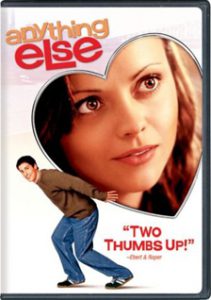Out of the Woody Allen movies that are on no one’s list of his best, “Anything Else” (2003) is my favorite. Featuring a Jason Biggs who has the same haircut he sported as Jim from “American Pie,” along with similar fumbling neuroses, the film not only taps into a new generation of actors. It also taps into a new generation of fans (at least in my case).
Competing neurotics
Considering that all her quirks and behaviors frustrate him (understandably so, as they get hilariously more extreme as the film goes along), it’s fair to say Biggs’ Jerry is with Amanda only because she conveys “a crippling sense of passionate heat behind those big eyes.” The casting of Christina Ricci is key here.
Viewers – especially those who see some of themselves in Jerry – can relate to him. But thanks to the benefit of a broader lens he doesn’t have in the moment, we can see he desperately needs to get away from Amanda.

“Anything Else” (2003)
Director: Woody Allen
Writer: Woody Allen
Stars: Jason Biggs, Christina Ricci, Woody Allen
Even Jerry’s older comedy-scene friend Dobel (Allen), whom even Jerry labels as crazy, tells him to get out of that relationship. And in reflective asides to the audience that represent Jerry’s future view, Jerry himself knows it. It’s the film’s open secret.
With the central problem being stated and continually repeated, “Anything Else” could play as pretty dark (as could Jim’s problems in “American Pie,” for that matter) if the tone was different. Jerry even says “I feel like committing suicide, but I’ve got so many problems, that wouldn’t solve them all.”
Still easy to like
But it’s not relentlessly dark; it’s enough of a breezy, silly comedy to stay likable. Allen gives us a taste of his old physical humor in a sequence that involves pivoting a piano in a small room and ends with Dobel dropping a lamp. He says “It can be glued” as we smash-cut to the next scene. I love that type of gag.
The film opens with Dobel giving advice to Jerry on a park bench in the form of punchlines, but “Anything Else” is not a case of Allen emptying his comedian’s notebook. Dobel himself becomes an enjoyably quirky character while remaining a legitimate source of good advice for Jerry.
It’s fun to see Biggs as a straight man reacting to Allen’s observations about uncomfortable topics like masturbation. Biggs got pigeonholed into this type of neurotic nice-guy role (see also how he plays across from Mena Suvari in “Loser”) because he’s so good at it.
Well-developed (if weird) characters
Also adding depth, Jerry and Amanda are more layered than their most obvious traits. At first blush, Amanda glides through life while Jerry is paranoid about everything. He worries about the appearance of eating alone in a nice restaurant while Amanda merely has a club soda. She argues: “What does it matter what other people think?”

Yet Amanda’s stresses are even more out there. She thinks she’s fat, which of course does not match with reality. She can’t make love to Jerry because she loves him too much, so she has sex with other men to test her general sexuality. Of course, this is funny, but within the context of the film, this is an actual problem Amanda has; she’s not messing with Jerry.
They have totally different personalities and outlooks on life. “Anything Else” argues that mutual physical attraction, and a shared love of Billie Holiday and Cole Porter, is not enough on which to build a relationship.
Immersed in the character’s romantic longing, I wanted Jerry to strike up a healthy relationship with Connie (Erica Leerhsen, “Blair Witch 2”), thinking she could be his “Autumn” (to riff on “500 Days of Summer”).
But on some level, “Anything Else” recognizes that Jerry has a problem in falling hard for surface adorableness, and maybe he should focus on his career for a while. That’s an unusual sentiment for an Allen film. So while it certainly taps into familiar traits, it’s not quite like anything else in his catalog.

